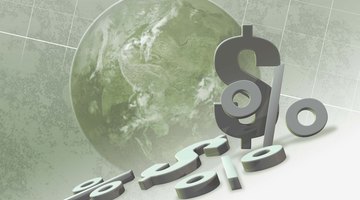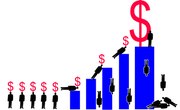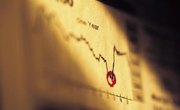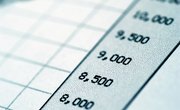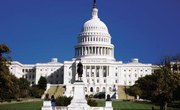Investopedia defines economics as "A social science that studies how individuals, governments, firms and nations make choices on allocating scarce resources to satisfy their unlimited wants." Thus, being a good economist means understanding people and studying the ways money is distributed in society. Completing a minor that complements your economics study might give you an edge over the competition.
Mathematics
Economists use math to help them make predictions about how the economy will respond to certain conditions. Economics majors are typically required to complete a calculus course, which helps prepare them to create and understand economic algorithms. If you complete a minor in mathematics, you will gain even greater proficiency in mathematics as you take mare advanced courses. Indiana University recommends advanced math preparation beyond calculus, especially linear algebra and probability and statistics, for anyone seeking a graduate degree in economics.
History
The old adage states that those who don't know history are doomed to repeat it. The same is true for economists -- they need to know history to avoid making economic blunders. The events of history are undoubtedly related to the ebb and flow of the economy within a society. Michael Pettis, writing for "The Economist," notes that the financial problems of ancient Rome weren't much different than those facing us today, so studying history can provide insight. Some universities, such as Yale and Vanderbilt, have programs devoted to economic history, so you may be able to find history of economics classes that fulfill your history minor requirements.
Psychology
The health of an economy ultimately depends on how people choose to use and regulate money. Thus, understanding how people think can help you understand how money works. According to the American Psychological Association, psychology studies the human mind and behaviors, from the intricacies of brain function to the actions of nations. Behavioral economics looks specifically at the role of human psychology in economic theory, and completing a minor in psychology will provide you with a good foundation in this area.
Sociology
The economy significantly affects people's quality of life within a society, so completing a sociology minor may also be useful for economics majors. Economic sociologists apply a sociological perspective when analyzing economic trends. According to the American Sociological Association, sociologists study "patterns of social relationships, social interaction, and culture." Thus, a minor in sociology might help you understand how the economy interacts with societal and cultural patterns.
Related Articles
References
- Greg Mankiw: Why Aspiring Economists Need Math
- Yale University: Economic History Program
- Vanderbilt University: Undergraduate Economics: Major in Economics and History
- American Psychological Association: Support Center
- Proceedings of the National Academy of Sciences: Behavioral Economics: Reunifying Psychology and Economics: Abstract
- Princeton University: The Sociological Perspective on the Economy
- American Sociological Association: The Field of Sociology: What Is Sociology
Writer Bio
Based in Sedona, AZ, Nicole E. Dean has two decades of intensive experience as a writer, editor, educator and book coach. She is a regular contributor to "BrainWorld" magazine and created the blog Mystic@theMovies. She also taught college writing for 11 years and holds a master's degree in English literature.

